Reporters: Christine Ge, Della Qing, Flavia Zhou, Isa He, Ivonne Deng, Jennifer Liu
Thai Community in Hong Kong celebrate traditional Thai New Year “Song Kran Festival” through splashing water in Kowloon City in April, 2025.
Reporters: Christine Ge, Della Qing, Flavia Zhou, Isa He, Ivonne Deng, Jennifer Liu
Thai Community in Hong Kong celebrate traditional Thai New Year “Song Kran Festival” through splashing water in Kowloon City in April, 2025.
Reporter: Belle Yip, Justin Tai, Swara Sanket Kamble, Whitney Kwok
Tsu Kwong-hong , 76, shares his persistent journey of fitness and bodybuilding.
Sakshi Vasudev speaks on breaking away from conventions as a model in the city through healthy physical and mental outlooks.
By Swara Sanket Kamble
While many models are encouraged to go on restrictive diets to achieve the fashion industry’s “ideal” thin body, Sakshi Vasudev, the first South Asian plus-size model in Hong Kong takes control of her health through a balanced diet and exercise routine.
“There is so much more in life than the way you look. You don’t have to change your ways in order to fit a certain standard of beauty. You can be the way you are and still be beautiful,” Vasudev says.
“It depends on myself if I want to have a good diet. I told myself if I want to pursue this [modelling] seriously, I need to keep myself in check. I have started going to the gym, taking care of my skin, and stopped eating junk food. I mean, from time to time I eat junk food, but it’s not like I’m stuffing my face,” the 23-year-old model says.
Vasudev usually has her mother’s home cooked meals such as curry, vegetables, and rice. Her favorite food is stir fry Chinese vegetables, like choy sum, with rice.
She points out the fashion industry plays an important role in creating beauty standards for models which are difficult to attain.
“Obviously this sets an unrealistic expectation that girls wanting to become a model need to starve themselves, eat salads, or even extreme to the point of throwing up after meals so it doesn’t affect their bodies,” Vasudev says.
“The type of [modelling] agencies that put models through diet restrictions and ask their models to puke after every meal are looked down upon,” she adds.
Vasudev highlights that the body structure of different nationalities is an important factor affecting body shape. “In East Asia, women are more slim and have a small bone structure. Whereas if you go to the West or South Asia, you’d know the body structure is quite big. And sometimes it has nothing to do with diet,” she says.
Weighing 73 kg and 171 cm tall, Vasudev works out three to four times a week, mostly focusing on training with weights and targeting different muscle groups.
“Now the media has played a pivotal role in showing what models should look like, but you can also see some representation of different body types. And I hope it continues where we see different body types in the fashion industry,” she says.
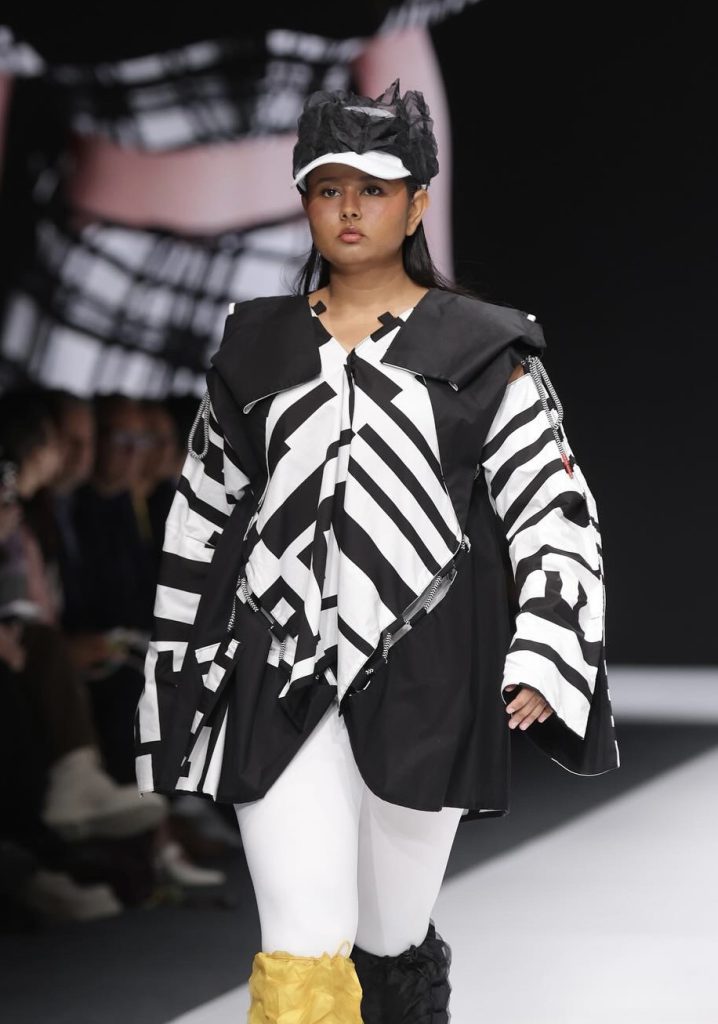
Vasudev joined ‘Self Management Hong Kong’ last year, a modelling agency, which hires diverse models and represents them globally. She is the first plus-size model who joined the agency.
She was previously signed to ChubbyChubby – Asia’s first plus-size modelling agency – from 2022 to 2023.
“I reached out to ChubbyChubby after seeing their TVB interview. Being Indian and curvy puts me on a unique edge so they were eager to sign me on. Their whole message was to be the first plus-size modelling agency in Asia and they want to change the norm in the industry,” she says.
Vasudev has modelled for many different brands such as makeup company Charlotte Tilbury, a luxury designer clothing brand Emma Wallace, and has walked the runway for Hong Kong based fashion brands Redress, The Hive, and Harmony HK.
“Traditional models are booked easily for editorial shoots for high end brands like Elle. Plus-size models are usually booked for active wear, lingerie, and upbeat, lifestyle types of photo shoots. These are usually for brands who want to showcase diversity,” Vasudev says.
Colored plus-size models usually get jobs once every two to three months.
“Hong Kong is not quite there yet in terms of diversity and inclusivity,” the model says.

In 2020, Jill Kortleve was the first plus-size model to walk for the French fashion house in over a decade.
“I believe the West is more open to plus-size models. Hong Kong is much slower. Since the pool of models here is quite small, brands prefer booking traditional models,” Vasudev says.
Precious Lee is one of her favorite plus-size models.
“I watched an interview posted on YouTube in which Lee talked about how she started walking for Versace. She told her agent that she wanted to model for Versace and they laughed at her. A few years later, she walked for Versace and became Donatella’s favorite,” Vasudev recalls.
This serves as inspiration for Vasudev.
Vasudev shares that high-end brands such as Chanel do not care about diversity, but more about brand image.
“There aren’t a lot of plus-size models modelling for luxury brands. I want to break that stereotype and model for Chanel one day,” she says.
Vasudev started modeling in 2019. She was 18. She especially loves walking runway shows.
“There is a certain type of energy I get on the runway. The moment you put me on a runway, I get a lot of confidence. I love it because you can showcase your personality and listen to music,” she says.
Vasudev auditioned for and was selected for a winter show by Harmony HK – which is the first diverse model agency in Hong Kong and Asia, representing models from all backgrounds, races, ages, shapes, and the LGBT community.
“Once I stepped on the runway, people cheered for me and it gave me such a confidence boost, because for my entire life I was always considered as not the prettiest one. I was seen as too fat, or I was always behind the shadows… I just wanted to try it out. I wanted to prove to people that people like me can be on the runway,” the proud model recalls.
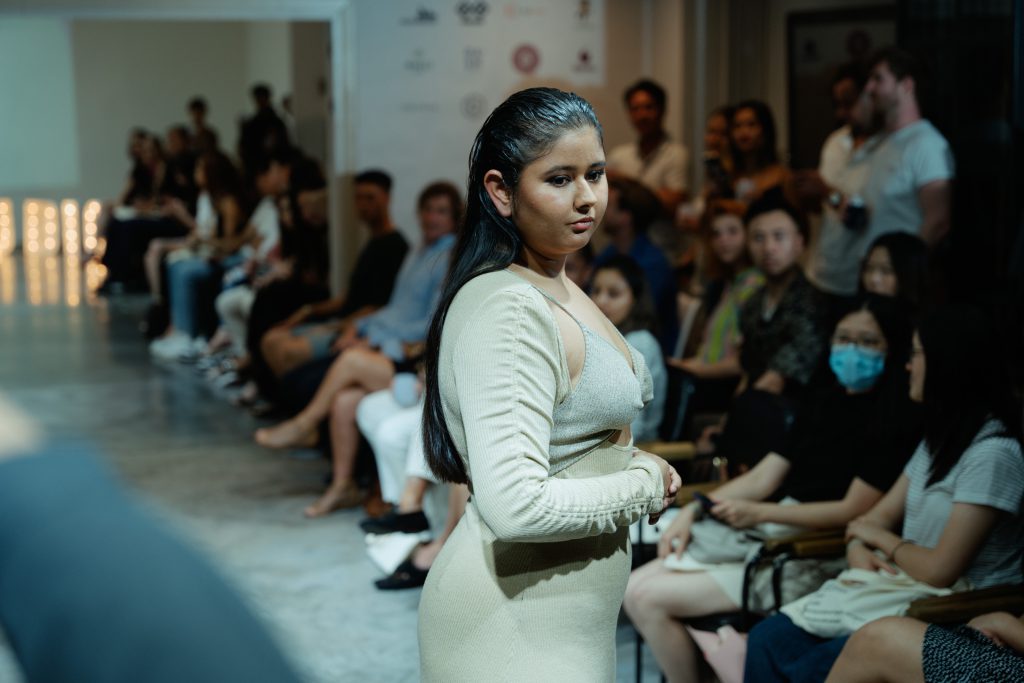
Being in the public eye means that Vasudev is no stranger to criticism.
“I once posted a reel of me walking and in the video you could see my stomach jiggling. I got a lot of negative comments from people, mostly guys, telling me to ‘go to the gym’. It really showcases how quick people are to judge,” the model says.
“Although the comments did affect me a bit, I’m here to walk and you’re [netizens] here behind your fake accounts while I’m getting rich,” she adds.
Vasudev recalls her high school days when she was affected by the names her peers called her.
“I started hiding myself in cardigans, even when it was very hot outside. I never wore dresses or skirts, I was always in jeans and t-shirts,” she says.
“Subconsciously, there’s always a part of me that says ‘you’re fat’. I grew up chubby, I didn’t suddenly gain this weight. There were times that I lost weight and then gained it back. Now it doesn’t matter if I am fat. I want to be the strongest version of myself physically and mentally,” she adds.
Vasudev is on a mission to prove people wrong and spread the message that everyone is beautiful in their own way. “If you know yourself and your health is okay, there’s no pain, and the doctor says you’re good, then everything is fine,” she says.
Vasudev reminds aspiring models to be persistent and urges them to keep trying.
“You’re going to get rejected and that’s ok. Don’t take it personally. Keep developing yourself and your skill sets. In a world of constant nitpicking, people constantly try to throw you down. Take that as motivation to get better,” she adds.
Edited by Lunaretta Linaura
Sub-edited by Cindy Lee
Our May 202r issue – More than Pets is now published.
Pets have become family members and friends of their owners bringing them joy and companionship. Pet related businesses have grown in recent years ranging from afterlife service, pet salon to pet insurance.
Varsity talks to business operators which provide funeral service for pets to learn the latest updates of the industry. Reporters find out tailor-made packages of funeral services are available for pet owners with different religious beliefs. Cremation service, funeral ceremony, souvenirs in memories of pet owners’ beloved flurry friends are all covered in these service packages.
While some animals are loved and cared for, the unfortunate ones struggle to survive. A former café operator Siu Lam-lam, the owner of Duncan’s Cafe in Mong Kok took care of up to 30 stray cats at one point.
She put cats in her café and her home to take care of them. She also helps them find new owners and feed stray cats. Cat lovers flocked to her café weeks before its closure in late March.
This issue is a reminder that pet owners determine the fate of an animal’s lives. They are more than pets and should be treated with love and care.
Other stories featured in the May issue include stories in both China and Hong Kong.
Varsity reporters look into an abandoned mine turned Cafe that has become popular, protestors involved in the White Paper Movement and their current state, smokers in Shenzhen ignoring anti-smoking rules and micro drama regulations in the Mainland.
As for stories in Hong Kong, we have stories about students doing self-study in Disneyland, secondary school students doing bodybuilding, the Community Care Service Voucher Scheme and the story of Hong Kong’s first plus-sized model.
Our May issue gives us more insights on both the Chinese and Hong Kong Community. Let’s take a look at the world around us.
Enjoy your read!
Cindy Lee
Chief Editor
By Isa He
Rigid micro drama regulations may curb creative freedom.
As a crazy fan of micro dramas, Cai Hanjun, a 20-year-old university student, watches micro dramas on Douyin for about one to two hours every day.
Hooked to her phone screen, Cai loves micro dramas – vertically shot, minute-long episodes featuring frequent plot twists. She enjoys genres like romance, suspense, and comedy, with a particular preference for stories about reincarnation and revenge.
“There’s one micro drama I really like, which is about a woman coming back to life and taking revenge on her husband who hurt her in her first life. It felt really satisfying and I was addicted to watching it,” the student living in Wuhan says.
As of June 2024, the number of Chinese micro drama viewers reached 576 million, accounting for 52.7 per cent of the total internet users in the country, according to the China Netcasting Services Association (CNSA).
In 2024, revenue from the micro drama market reached RMB ¥50.40 billion (US $6.93 billion), surpassing the box office of Chinese movies for the first time, according to DataEye, a digital research firm based in Shenzhen.
The firm also estimates that the micro drama market will surpass RMB ¥100 billion (US $14 billion) by 2027.
Whilst the popularity of these ultra-short, binge-friendly micro dramas has been booming in recent years, they have also brought scrutiny from the government.
Since 2024, the National Radio and Television Administration (NRTA) has tightened regulations on micro dramas by introducing new rules on content review, theme direction, and platform responsibility.
On February 5, it released a notice that a classified and three-tiered review system based on production themes and budgets has been established.
Key micro dramas, with a budget of RMB ¥1 million (US $136,729) or more, or involving sensitive topics such as politics, military affairs, diplomacy, or national security, must undergo national-level review.
Regular micro dramas, with a budget ranging from RMB ¥300,000 (US $41,018) to RMB ¥1 million (US $136,729), are reviewed by provincial-level radio and television authorities.
Smaller productions with a budget under RMB ¥300,000 (US $41,018) are supervised by streaming platforms, which are responsible for internal content review, copyright compliance, and routine reporting to regulators.
Noting that the new regulations aim at fostering industry growth and ensuring stricter governance, the NRTA requires all micro dramas to hold an online drama distribution permit and display a government-issued license number. It also introduces a “white list” system banning unlicensed content from being promoted or monetised.
It adds that the new measures hope to prevent the industry from over-commercialisation and encourage content that aligns with public values and social responsibility.
Due to the regulations, Cai noticed that the type of “satisfying” dramas she likes has become harder to find. “I used to see a lot of dramatic plots. Now, it’s harder to come across them. It’s a bit disappointing,” she says.
“The shows I watch do have distorted values. And yes, some dramas could negatively affect people’s thinking. So maybe regulation is necessary,” she says.
But Cai does not like the government’s tighter control over micro dramas, as these policies dampen creative freedom. “It makes people feel restricted… I hope they won’t interfere too much so there is more creative freedom,” she adds.
When asked about her view on the three-tiered review system for micro dramas, she says, “As long as I’m not restricted, I want to be in the group that can watch everything.”
The industry regards the new regulations as a watershed that micro drama is shifting from rapid, unregulated growth to a stage of stricter policy guidance and compliance.
Li Tao, the founder and CEO of Fengxing Culture, a micro drama firm in Xian, western China, sees the new regulations as a turning point, signaling both official recognition and rising expectations for the industry.
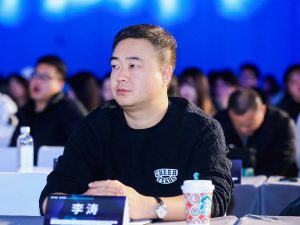
Li points out that at the start, the industry grew wildly, resulting in many micro dramas with content being vulgar, violent, and other unhealthy values.
“It is only after the supervision of relevant departments and the introduction of relevant policies that the industry is gradually moving towards a more and more standardized direction and healthier development,” he adds.
Li notes that many micro drama production companies that fail to produce high-quality work have been eliminated by competition and market forces in the past two to three years.
He says his firm will strictly follow the policy requirements to create more content with correct values, correct guidance, and diverse topics, encouraged by the government.
Assistant professor Lin Jian of the School of Journalism and Communication at the Chinese University of Hong Kong reveals that the regulations are very much related to the political system in China.
“In China, cultural governance has been a significant part of national supervision. Because the Chinese government is a one-party system, it requires its society to be consistent with its ideology. It conducts a content review to ensure that the values are consistent with the mainstream ideology,” he says.
“Since the market of micro dramas has grown rapidly in the past two years, many Chinese are exposed to them. And as a cultural product, it involves values and ideology, so government censorship will come in,” he adds.
Lin stresses that the industry has a wealth of experience in dealing with government regulations while maintaining freedom of creation, and supervision of micro dramas is much more complicated than that of films.
“Even though those regulation policies are now introduced, the production of content on the internet is freer compared to the production in traditional media. Wheth
er an internet company or a government department, they don’t have enough time, manpower, or capital to conduct a detailed review of every piece of micro drama content, unlike a movie review,” he adds.
Stating that the three-tiered micro drama review system can enhance the efficiency of the reviewing process, Lin hopes that the review system can be better defined and polished.
“It is necessary to regulate cultural content, especially the production of the so-called mass culture and popular culture. But the question is how you establish a transparent review system, the human factor of the current review system is still relatively large, and its boundary is not very clear,” he says.
Edited by Yika Ng
Sub-edited by Lunaretta Linaura
Siu Lam-lam, the owner of Dundas Cafe, reflects on her journey of making her restaurant a foster house for stray cats.
By Whitney Kwok
Former restaurant owner Siu Lam-lam is now devoting all her time to care for her beloved furry friends, as she closed down her restaurant in Kowloon. In the past nine years, the restaurant used to be a happy hang-out spot for her customers and a safe haven for stray cats.
“My restaurant is more than just a dining place. It is a place of warmth, a place for gathering and gossiping, a place for people to share their happiness over cats, and most important of all, a place for needy cats,” Siu says with a smile.
After the closing of the restaurant, Siu takes a break from her 12-hour work schedule and spends time with her 30 cats at home.
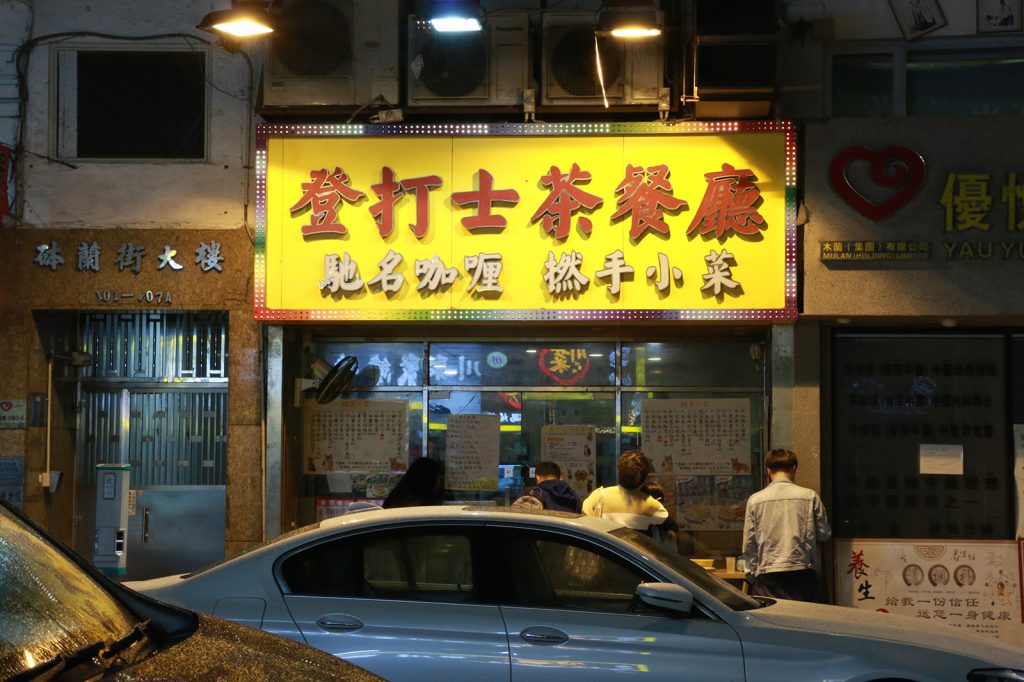
Siu continues to help needy cats by keeping in contact with other stray cat feeders she knows.
“I told them to help me feed stray cats in the area where I used to feed them, and to feel free to find me if they need any supplies,” she says.
Three “cat managers” Eggplant, Cotton Candy and Milk Milk, have also retired from Dundas Cafe, a Hong Kong-style cafe in Mong Kok.
“The cat store managers will continue to stay with me, and receive training for the next job,” Siu says with a laugh, adding that she took care of 18 cats in total at the restaurant when at its peak.
Since 2016, Siu has helped at least 286 cats find a home, clearing most of the stray cats in the area around her restaurant. An average of about HK $7,000 (US $902.26) was spent every month on veterinary medical treatment, cat food and other expenses.
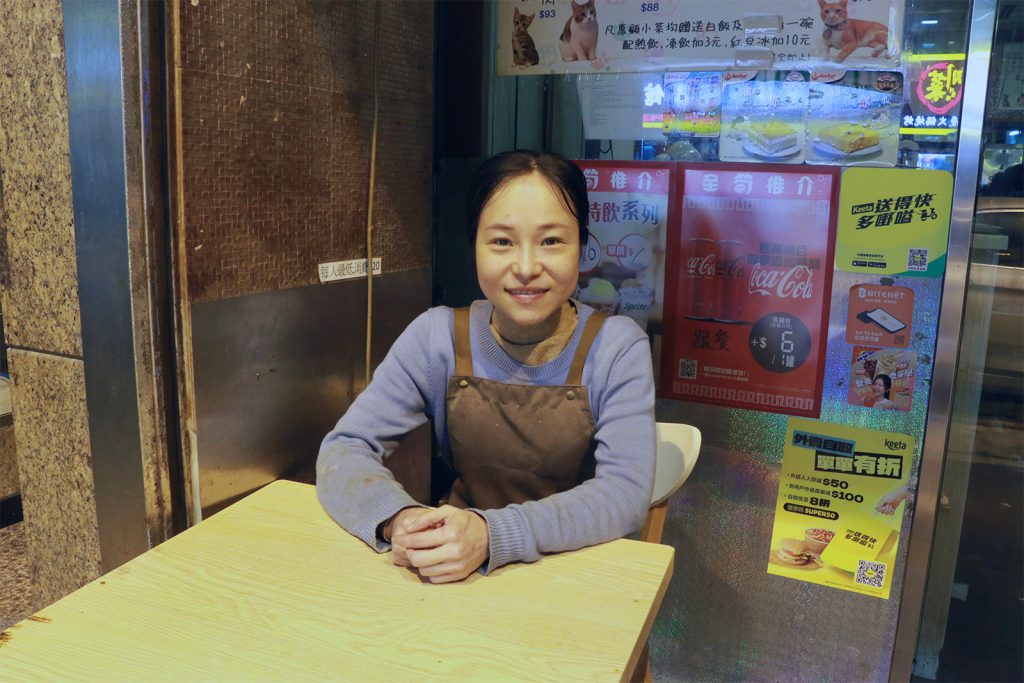
On March 7 2025, the restaurant owner announced on Facebook that she was going to close down the restaurant at the end of March due to economic downturns after nine years of operation.
At the time, there were still about 30 foster cats seeking adoption, and 19 of them were soon adopted, three weeks before its closure.
Siu conducted home visits before handing over her beloved cats to their new owners to make sure the cats would be well-taken care of, even during the preparation to wind down her restaurant.
“Having a secure safety net on all windows is a must, the regular mosquito net or a magnetic one is not enough, as cats can easily scratch them off,” she adds.
She also checks if potential adopters have prepared cat necessities, including cat food, litter and medicine, before handing her cats to them.
“Every adoption is like arranging a marriage for my daughters. I don’t arrange adaptation just for the sake of giving away the cat, instead I want to find a safe, loving and warm home for every one of them,” she says.
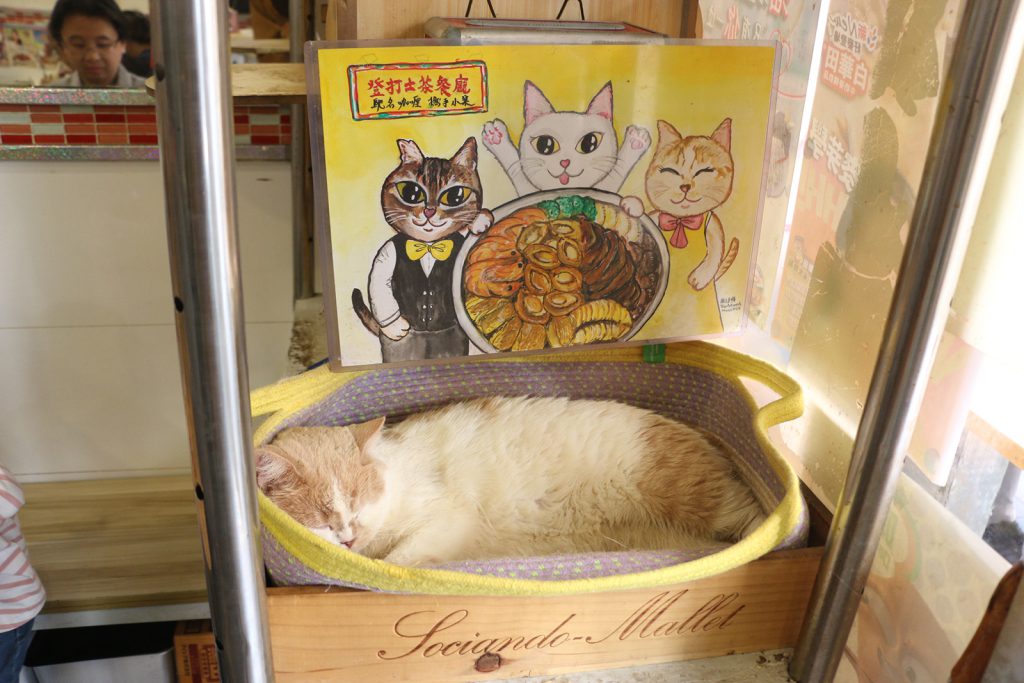
Siu requires pet owners to send her photos of the cats to make sure they are settled well.
“Seeing how cats changed from being skinny and sick, to becoming princes and princesses in their homes makes me realise that all my efforts and time spent are worthy. It brings me joy that money cannot buy,” the cat lover shares.
Siu keeps the rest of the cats herself because of their old age, adding that the remaining cats are 12 to 18 years old, equivalent to over 60 years old in human age.
“Old cats cannot adapt to new environments easily and might feel stressed about moving to new places,” she says, adding that cats can suffer from issues like inflammation.
Having recently moved into a new and bigger flat to accommodate her 30 cats in mid-March, Siu recalls her cat story that began in 2017.
When Siu dumped rubbish in a back alley after work, she saw skinny and sick stray cats digging for food in the trash.
“A pack of cat food did not cost much, so I started feeding them regularly after work ever since,” Siu recalls.
“More and more cats started to go to the spot where I first fed them. After a while, some cats allowed me to pet them, so I decided to take them in to stay in my restaurant and take them to vets for medical treatment, ” she adds.
The café was then known as the “affordable cat cafe” in the neighbourhood. While most cat cafes serve western dishes for over HK $100 (US $12.85) and charge an extra entrance fee of around HK $50 per hour (US $6.43), the Cha Chaan Teng provides a large range of Hong Kong-style food including dish rice for around HK $50 (US $6.43) and side dishes range from HK $70 to $100 (US $9 to $12.85).
“We lost some regular customers because they were concerned about hygiene. But many cat lovers started coming to my restaurant,” Siu recalls.
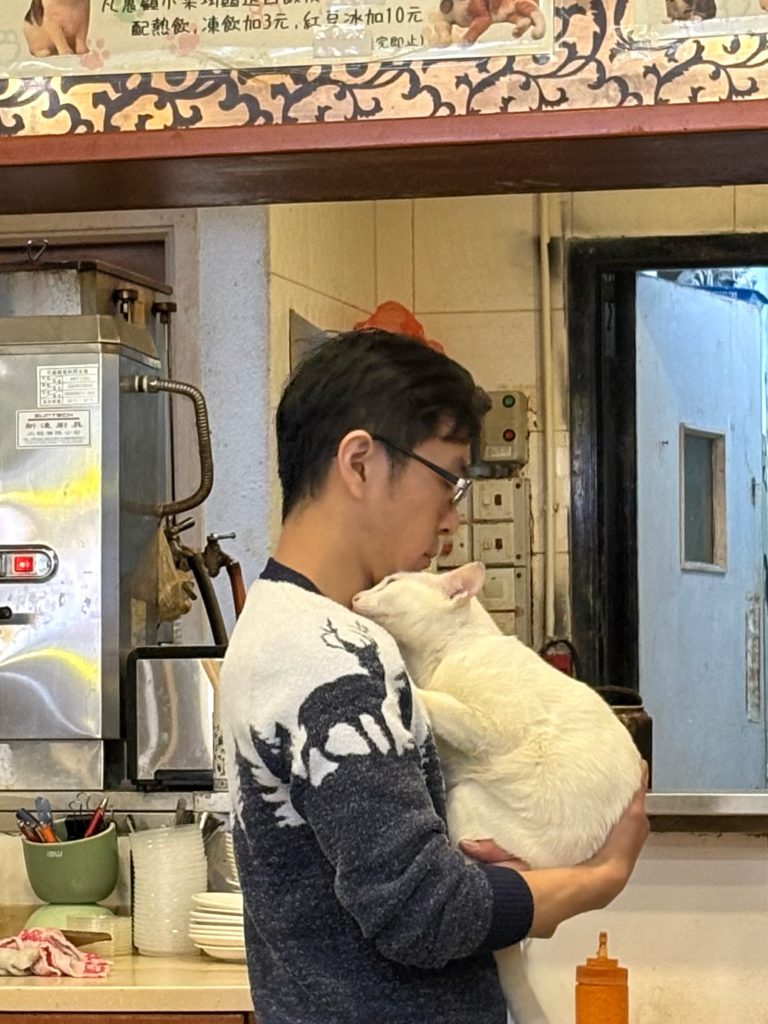
While Society for the Prevention of Cruelty to Animals, Society for Abandoned Animals and other charity groups are active in handling stray cats, the number of abandoned animals continues to increase as owners surrender their pets due to various reasons such as pregnancy or newborn baby, immigration and housing issues according to the Agriculture, Fisheries and Conservation Department.
There are also reports about the abuse of stray animals. Under the Prevention of Cruelty to Animals Ordinance, the maximum fine is HK$200,000 and carries a maximum imprisonment of three years if found guilty of cruelty.
“Some people might pour alcohol or put rat poison into food bowls for cats, so I usually stay for an extra hour after work. I return home at around 1 to 2 a.m.,” she recalls.
Her friends and customers also took the stray cats they found to the restaurant.
“My customers took cats from all 18 districts to me, as they trust me. Some are even from Mui Wo and Cheung Chau,” the former restaurant owner says.
Siu is concerned about whether it is ethical to keep store cats, as she has rescued at least 20 abandoned store cats in the past.
“I don’t understand why some store owners just abandon their store cats when they close down. They are loyal employees who work for free,” she says.
“Still, some store owners treat their cats as their children and keep them at home after closing their business,” she adds.
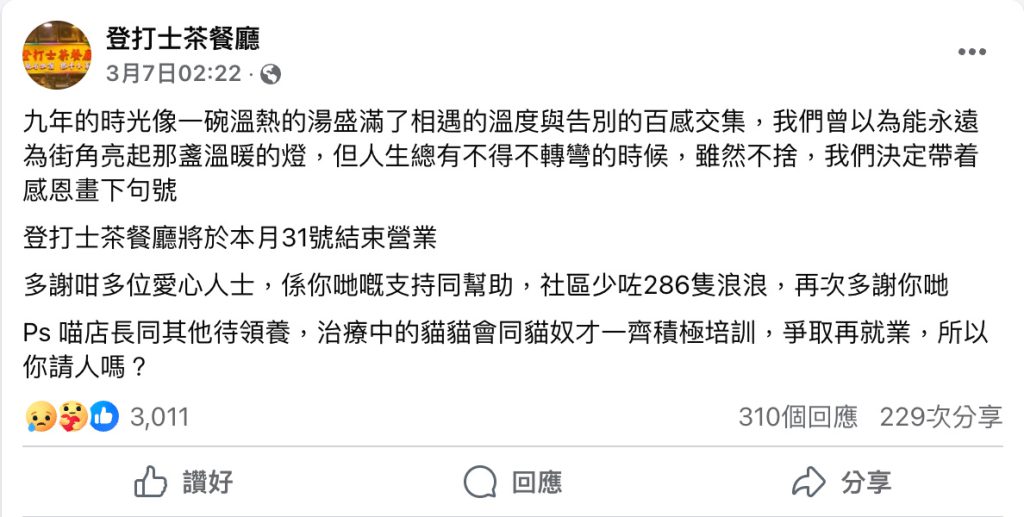
Siu reflects on her nine-year journey with mixed feelings.
“Many friends greet me as I go to work every day. I will definitely miss this neighbourhood after the closure of my restaurant,” she says.
“I hope that me and the cat shop managers can get back to a restaurant soon, so that we can sell food while rescuing cats and meeting new friends,” she adds.
“But now let me take a rest, relax and play with cats at home first before considering future plans,” she says.
Edited by Daniel Koong
Sub-edited by James Cheang
Dedicated secondary school students share their inspiring story of bodybuilding.
By Justin Tai
A rejection from a crush may lead to a broken heart. But to Huang Wang Yu, it can be a source of power in the gym. The teenager started bodybuilding to mend his broken heart when he was 15.
“Being rejected turns out to be a good thing that makes me embark on my fitness journey,” the Form Six secondary school student recalls with a smile.
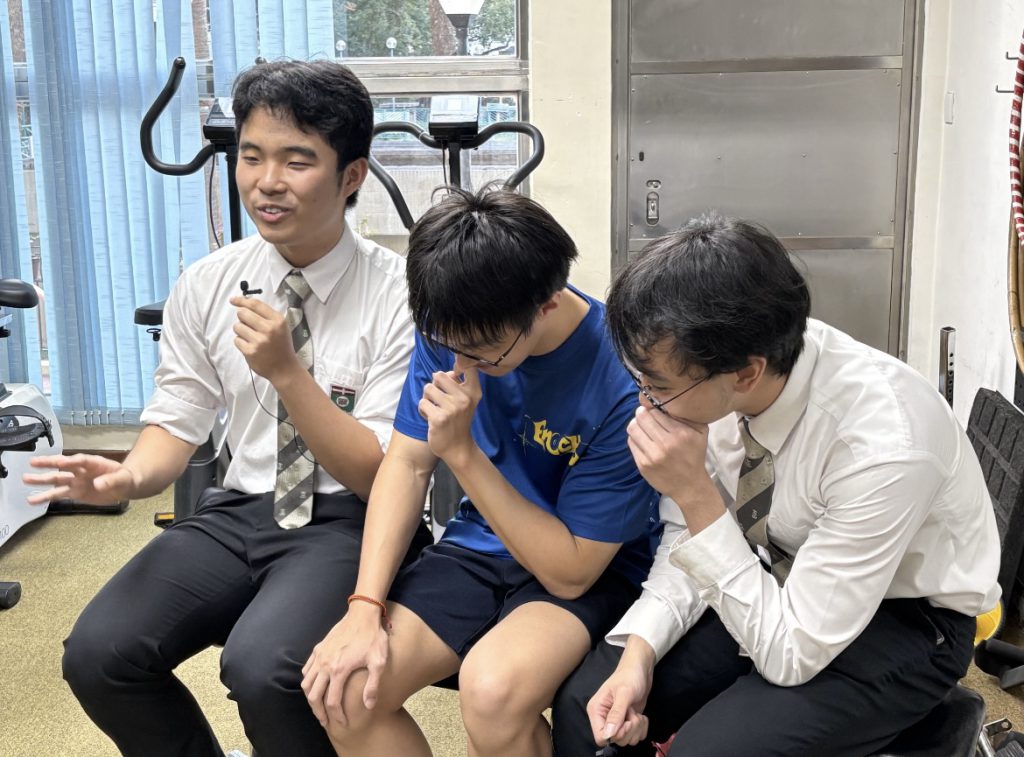
As the leader of the Bodybuilding and Fitness Society of Salem-Immanuel Lutheran College, Huang, now 18, has a six-day workout routine, in which he starts off with training his chest, followed by back on the second day and legs on the third.
“Each exercise is repeated for four sets until I reach my limits, a cardio-session is also added in each workout, which lasts around one-and-a-half to two hours,” he shares.
The cycle repeats twice a week with just one rest day in between.
Apart from Huang’s daily workout routine, he does not let his guard down on his diet as the goal is to keep fit and lower his body fat.
“My diet is bland and boring, I’ve been consuming as little rice and oil as I can, and my diet is mainly composed of meat and vegetables,” he shares.
In July 2024, his school held an inter-school bodybuilding competition. The 18-year-old won second place.
“The feeling was so crazy, because I have never thought the show would stir up this much attention from the bodybuilding community and the media,” Huang shares.
Behind the stage was not all sunshine and rainbows.
“Four months before the competition were the most tiresome and difficult periods,” Huang recalls.
With strict diet discipline, he only ate boiled chicken breast and blanched broccoli, and the amount of carbohydrates could be counted on the fingers of one hand.
“I kept eating the same thing three times a day for three months straight, let alone the six-day weightlifting and cardio routine. It was a living death,” the bodybuilder sighs.
Besides Huang’s daily routine, he also had to keep up with his studies and prepare for exams.
“It was pretty hard for me. But I decided to focus more on the competition and put away my studies for a while,” Huang recalls.
To recover muscle and release stress, Huang cut the workout routine down to three days a week just before the competition, ensuring he was in peak condition.
Having fulfilled one of his bodybuilding ambitions through the competition, Huang sees it as the beginning of his bodybuilding journey.
“I will participate in bodybuilding competitions when I am in university and win as many awards as I can. I want to be a fitness coach or a personal trainer,” he says.
While Huang started bodybuilding for a romantic reason, his gym buddy Law Tsz Shing, who just wanted to kill time by doing workout, has evolved from a shy boy to a confident young man.
“I had so much spare time that I didn’t know what to do, so I thought working out would be great, I might as well improve myself,” the 18-year-old student, who started bodybuilding when he was in Form Four, says.
“I’ve been sticking to a five-day workout routine. A week starts off with chest, followed by arms, back, shoulders, and legs, I usually do four sets of twelve reps for each exercise,” he shares.
Like most beginners, Law did not have any clue of what to do at the gym.
“When I first stepped in the gym, I felt uneasy because I didn’t know anything about fitness and weightlifting,” Law recalls.
The shy teenager in the first three months of lifting was guided by Huang, who encouraged him to join the bodybuilding competition.
“I was so nervous about this, especially during the two weeks before the competition. It gave me so much pressure knowing that I would be half-naked and posing in front of a big crowd,” the secondary student, who came fourth in the contest, says.
Law has evolved from once a timid and skinny boy to a man standing up on the stage showcasing his muscles.
“I wasn’t as sporty as I am today. I was more academic-oriented and I played sports just to kill time, but now going to the gym has become a hobby,” Law shares.
“I never thought of becoming a professional bodybuilder anytime soon; lifting weights is simply an interest for me now,” the 18-year-old adds.
The transformation of these young men would not have been possible without Wong Chun Man, one of the masterminds behind the school’s bodybuilding society and competition.
Also, as a gym-goer himself, Wong believes the results of working out are much harder to achieve than solving a math problem.
“I believe students who are in the bodybuilding society are very persistent and aren’t afraid of hardships. Even if you keep working out tirelessly, you may not see changes instantly. Because it takes so much perseverance and time. But for studying, as long as you revise, you can quickly see improvements,” Wong shares.
“Students can learn this important life lesson of being determined, that you must put in great effort in order to have great results,” he adds.
He points out that encouraging students to work out also helps solve their sleeping problem.
Wong, the vice-principal, also believes it is challenging for the young generations to find a particular hobby or interest due to the era of smartphones.
“Using one to two hours of your day working out at the gym is far better than two hours of mindless scrolling on smartphones,” Wong shares.
“Seeing the way students enjoy a specific hobby other than playing smartphones and getting results from it is already a great success to me,” he adds.
As the bodybuilding competition has gained traction from the public, the vice-principal decides to organize the competition again this year on 9th July.
“We have invited all secondary schools in Tai Po District to take part in the event this time, including the alumni. We hope to promote this event on a bigger scale,” he shares.
Edited by James Cheang
Subedited by Daniel Koong
Mainland girls keep cotton dolls as their children.
By Jennifer Liu
To provide a home sweet home for her 16 cotton dolls, Jessica Huang’s family spent about RMB¥200,000 (about US$28887) to buy a 35 square meter flat in Hebei province.
“I want to have a home that’s just for me and my ‘children’,” Huang says, explaining that she treats her dolls like her daughters and sons.
“My parents think I am being childish for keeping and taking care of my dolls. They think I should focus on studying, and collecting dolls is a waste of time and money. They often complain that my dolls take up a lot of space and their reaction makes me feel very stressed,” the 20-year-old university student says.
Huang suffered from depression and anxiety due to pressure from her studies and interpersonal relationships when she was a high school student.
“But thanks to my dolls and new friends I made online to share our experience of taking care of cotton dolls, I am no longer depressed,” she says.
Her parents bought her the flat in 2023 after learning that her daughter’s mental health had improved after she started collecting cotton dolls.
“Taking care of my cotton dolls helps me relax. I don’t have to worry about saying the wrong thing that might upset others. I really enjoy chatting with my dolls,” the Year Three student says.
Huang chats with Cotton Doll about the boy she likes, academic and interpersonal difficulties, disputes with parents, and thoughts on the future: “I need more listeners than responders.”
Huang spends at least five hours a day with her dolls and online friends who share the same hobby. They have conversations online about various topics like doll clothes, finding photographers for their dolls, newly launched dolls and so on.
“It requires lots of effort to take good care of my dolls. I have to dress them up like the way my mother did to me when I was a child, ” she says.
Huang takes two to five of her dolls with her wherever she goes, such as the school library and cafeteria.
“Hanging out with cotton dolls is like being with my friends or children, it gives me a feeling of company. My cotton dolls bring me peace of mind and warmth, even in unfamiliar places like restaurants or libraries where there are many strangers,” she says.
Huang says she does not want to have children in the future.
“Children are noisy and immature. It is very costly to raise a child. If I keep a pet, it will one day pass away and I will be very sad. But cotton dolls will always stay with me,” she says.
The fertility rate among young people in China is continuously decreasing. According to the National Bureau of Statistics, China’s birth rate has been declining from 2014’s 13.8 per cent to a historic low of 6.4 per cent in 2023.
Another cotton doll collector, Emily Lau, 24, has already spent over RMB¥100000 (US$13800) on her 58 cotton dolls.
Lau says she has been “raising” cotton dolls since 2018 because she finds them cute and affordable.
“When I had to renovate my home in 2024, I specially reserved space against a wall to install cabinets for my dolls,” she says.
Lau shares, doll owners are nicknamed “mama” in the cotton doll community, as these cotton dolls are not just decorations and are very important to their owners and their mental wellbeing.
“Mama” usually dresses them up, designs their hairstyles and buys them accessories,” she says.
The 24-year-old worker says each set of clothes for cotton dolls costs her several hundred yuan, even more expensive than her own clothes. She also buys shoulder bags and baby prams for her dolls.
“When I take pictures of the dolls, many people look at me with confusion. I don’t feel embarrassed because I believe I am no different from a mother who takes pictures of her children,” she says.
Just like real children, cotton dolls need to take regular showers. As cotton fillers cannot be washed directly, so “mama” usually spends a long time gently brushing off dust from cotton dolls with a soft-bristled brush or a slightly damped soft cloth.
Lau shares the production of cotton dolls is very complex and usually takes half a year to make one.
“The long waiting time makes ‘mama’ look forward to seeing her baby doll and cherish them even more, just like a mother looks forward to meeting her newborn baby,” she says.
Married for four years, Zhang Li, 33, also enjoys having cotton dolls as her companions.
Zhang lost her job in 2020 during the pandemic. Feeling lonely and anxious, she started raising cotton dolls and made many friends with similar hobbies on online platforms.
She shares that taking photos of her cotton dolls and posting them online is an important moment for nurturing dolls and exchanging tips about taking care of cotton dolls.
Zhang often pictures her dolls in coffee shops, scenic spots, and concerts.
“I really want someone to pay attention to my dolls collection and talk to me about this. I enjoy this feeling. When I see a cotton doll post getting a lot of ‘likes’, I start thinking about how to shoot better,” she says.
Zhang has built a small room on her desk for the dolls, with tables, chairs, computers, recorders, and carpets arranged like a human family.
“I prefer playing with cotton dolls that help me gain many likes and shares on social media platforms. I tend to find them more adorable and buy them more clothes than other dolls,” she says.
Zhang says her husband respects her hobbies very much. “ He always praises the way I dress up my dolls and even helps me imagine the shooting scenes for them. He likes to collect anime figurines. We don’t have any children at the moment, and these ‘useless toys’ in the eyes of others have become our spiritual children.”
“Compared with my husband, my dolls are better companions,” she adds,“Sometimes my husband makes me angry, but the dolls can accompany and listen to me when I am angry. When I am alone at home, it’s the dolls accompanying me. The doll spends much more time with me every day than my husband does.”
On Xiaohongshu, a Chinese social media platform, there are over 59.25 million discussions and 5.37 billion views under the “Cotton Doll” tag as of April 2025. According to Research on the Development Trends and Future Investment Analysis of China’s Cotton Doll Industry (2025-2032) by INSIGHT AND INFO, the market size had reached 11.2 billion yuan in 2023, and it is expected to exceed 15 billion yuan by 2025.
Professor Dai Ying of Journalism and Communication of Shandong University of Finance and Economics points out the popularity of cotton dolls shows girls long for warmth, companionship, and a sense of belonging.
“Dressing up cotton dolls according to their own ideas is actually creating an idealized version of themselves. Creating a “beautiful living space” for dolls is actually projecting one’s own plans and imagination for future life onto them,” Dai says.
Professor Dai also notices that “mamas” take online feedback of ‘like’ and ‘share’ seriously.
“When data becomes a standard for measuring love, it reflects the mentality of East Asian parents who have high expectations of their children,” she says.
Edited by Cindy Lee
Sub-edited by Zora Yan
Smokers turn a blind eye to no smoking sign in Shenzhen.
by Ivonne Deng
A tiny no-smoking sign that can hardly be seen is hung on a wall inside a bar in Shenzhen. A few ashtrays are placed on its bar counter.
“I know that smoking is banned in public areas including bars, but I never stop customers from smoking. Otherwise, my business will suffer,” its bartender, Zhang Jinglong, says as he passes an ashtray to one of the customers who is smoking while drinking.
“Customers can still smoke in bars and restaurants whenever they want,” Zhang, who has been working in the bar for three years, adds.
Since 2014, it has been illegal to smoke in bars and restaurants in Shenzhen. Offenders are subject to a penalty of RMB¥50 (US $6.8) if they stop smoking when being warned. A higher fine of RMB ¥200 (US $27.22) will be imposed on an offender if he or she refuses to stop smoking, and if he or she confronts officers, he or she will face a fine of RMB ¥500 (US $68.04).
Though hidden on a wall in the bar, the no-smoking sign clearly states the fine and complaint hotline.
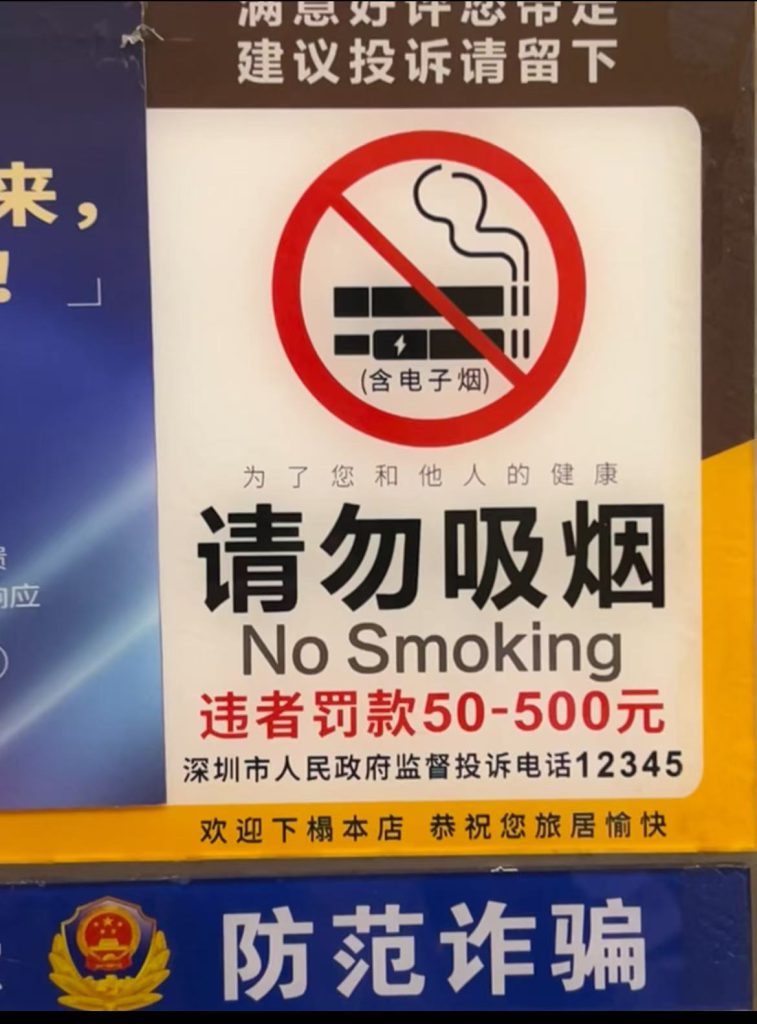
But no one in the bar in Futian, southern Shenzhen, pays any attention to the sign, including the bartender.
“I’m also a smoker. I have been smoking one pack of cigarettes a day for eight years. The anti-smoking policy hasn’t changed my habits at all. All the smokers I know have never been fined,” Zhang says.
While allowing customers to smoke, he doesn’t worry that non-smokers will ruin the business.
“Non-smokers come to bars as well. They stay if they can bear it,” he continues.
While Zhang sees no one taking the smoking ban in Shenzhen seriously, the Public Hygiene and Health Commission of Shenzhen Municipality states that the city has the strictest smoking control policy among all cities in China.
The Shenzhen government released a special economic zone control smoking ordinance in 2014, and revised it in 2019 to include a ban on e-cigarettes.
The government claims that no-smoking signs are posted in nearly 90 per cent of indoor premises such as restaurants, government offices, and shopping malls.
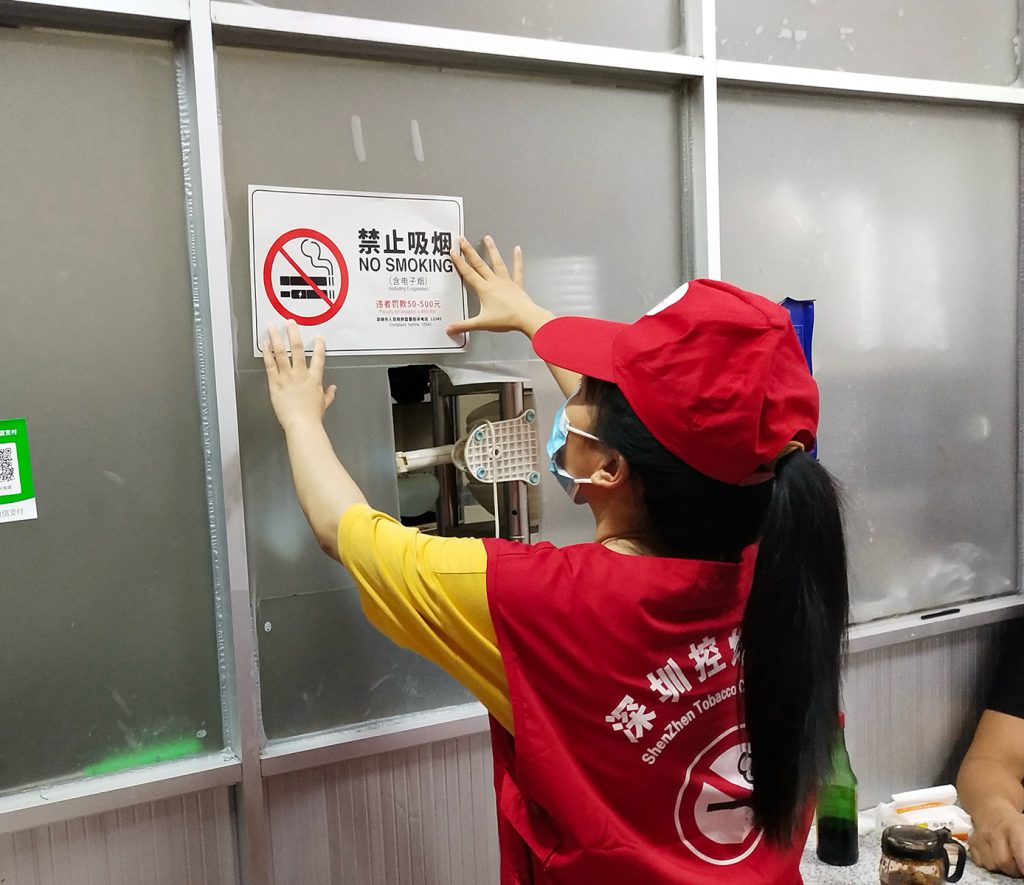
University student Ni Ziyi, who often goes to restaurants and bars in Shenzhen, says that she cannot stand second-hand smoke.
“Once I find customers smoking in any indoor premise, I just leave,” she says, adding that she does not dare to confront smokers in a bar or restaurant.
“To avoid conflicts, I won’t stop them, and I have never seen any restaurant or bar operator do so. Smokers in China are mostly middle-aged men. They are difficult to talk to and easy to get angry. I think that is the main reason why nobody stops them,” she says.
The Year Two economics major student is disappointed when talking about the anti-smoking policy.
“I have never seen any authority or volunteers telling smokers to stop. I don’t think anyone is enforcing the law in Shenzhen. And I don’t believe there will be. Smokers will always smoke,” she says.
But Yu Mingyun, leader of a smoking control team in Longhua District, Shenzhen, a government-organized volunteer team, says he finds there is a drop in the number of smokers.
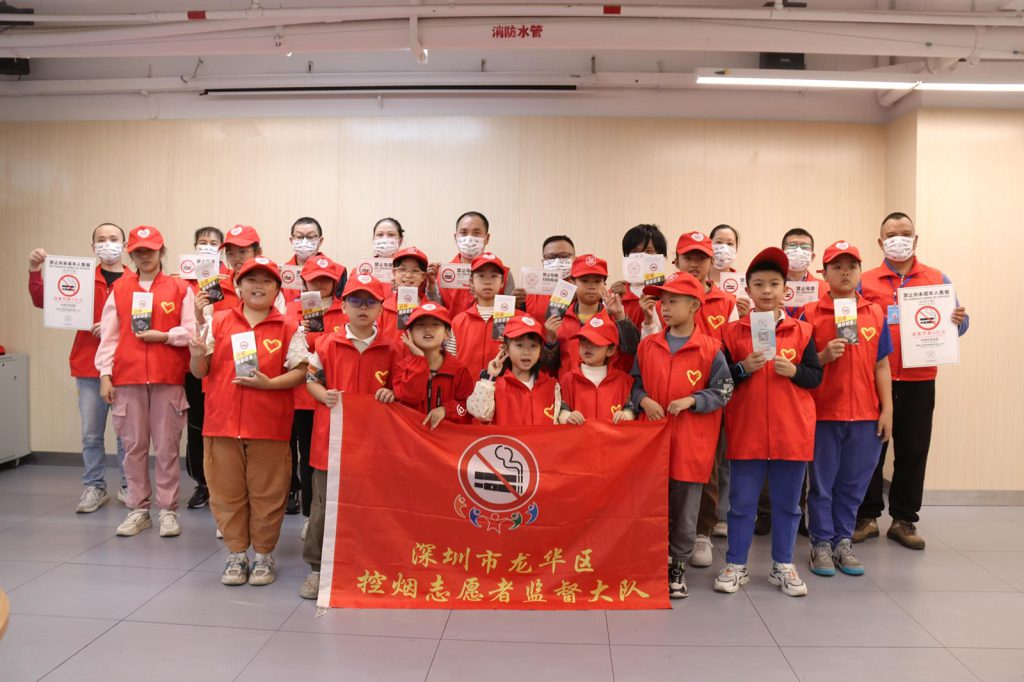
Yu’s 20-member team patrols bars and restaurants in Longhua District once a week.
“We walk around the community, check if smoking signs are posted in every indoor premise such as restaurants and stores, talk to business operators, and stop smokers from smoking,” he says.
Stepping into a shop, Yu starts talking to the owner after checking the signs. “We are smoking control volunteers. We ask smokers to go outside or stop. Smoking is bad for health and dangerous as it may cause fire,” he says, though most business operators stay silent.
The team gives smokers pamphlets about the no-smoking policy, but rarely urges them to stop smoking if they do not want to.
The team also has to handle customers’ complaints. People can take photos of smokers in indoor premises like restaurants and upload them to a WeChat mini programme launched by the Shenzhen Tobacco Control Office in 2024. Volunteers then go to do checks in two days.
But as volunteers, they have no right to fine offenders. “Most smokers are willing to cooperate. But the only thing we can do is to give advice,” Yu says.
“I have taken part in volunteer work for five years. We do not see people smoking in office buildings and restaurants, and all my family members and friends don’t smoke or have quit smoking,” Yu shares.
Two college students joined his team as volunteers in March, and Yu believes more young people will join him to fight smoking.
“I know it is difficult to stop these smokers, but at least we should make an effort, and I am committed to doing this,” he says.
Edited by Bliss Zhu
Sub-edited by Cathleena Zhu
Hong Kong pet owners hold tailor-made funeral service for their beloved pets.
By Whitney Kwok
In Ruby Lai’s* bedroom, a jar containing the ashes of Siu Dim is placed on a bookshelf along with a picture of her pet dog. She also made a necklace and a paw print for her sister in memory of their beloved furry friend.
Lai euthanised her 15-year-old dog after it suffered from acute heart failure in December 2024. She called a pet hospice care service company to collect the remains from a clinic to the company’s centre.
The toy poodle’s body was refrigerated and cleaned in the centre. A 40-minute mourning ceremony was held before cremation a few days later.
“About 10 friends and relatives attended the ceremony. During the ceremony, a video of Siu Dim’s life was played. We talked about our memories with our furry friend, then we bid farewell to our beloved Siu Dim,” the pet owner recalls.
The service costs HK $1,800 (US $231.37) for the death care services, and an additional HK $1,200 (US $154.25) for the souvenirs.
“Pets are not just toys for fun. They are our lifetime companions that have become members of our family. When a family member passes away, the remains are not just dumped into a refuse collection point,” she says.
Under the current law, there are no strict regulations on the treatment of animal bodies. Pet owners are advised to pack dead animal bodies properly in plastic bags and deliver the remains to the Public Refuse Collection Points in all 18 districts in Hong Kong, which will then be sent to landfills.
H.K. Pet’s Hospice Care Service is one of the service providers in Hong Kong.
“Pet owners can’t bear to just pack their beloved pets’ remains in plastic bags and throw them away. Our service can offer a venue for them to bid their pets a proper farewell,” business development manager Chillie Woerm says.
The company also offers other services such as pet memorial souvenirs, including necklaces, 3D paw prints, crystal blocks and photo frames, made with the pet’s bones, ashes or hair, which cost from HK $638 (US $81.89) to HK $2,980 (US $382.66).
Pet memorial cabinets can also be rented by owners to store the ashes of their pets with the pets’ food bowls and toys. The annual cost ranges from HK $1,500 (US $192.52) to HK $3,200 (US $410.71), depending on the location of the cabinet.
“Most of the cases we handle involve cats and dogs. In the last two years, we also have more clients with small-sized pets like hamsters and chinchillas,” Woerm says.
The company has also received requests for hosting funeral services for goldfish and turtles whose owners used to just flush down the toilet.
It costs from HK $1,280 (US $164.31) to HK $8,280 (US $1062.76), depending on the size of a pet for individual cremation services. Every pet is cremated in an independent tray of its own.
“After receiving calls from pet owners, we will collect the pet’s remains from them. Then the bodies will be refrigerated in the cold storage and cleaned in a room equipped with an Ozonized Water Disinfection System by a funeral director,” Woerm says.
“The farewell ceremony can be tailor-made. We provide three types of rooms: Chinese styled one for pet owners who are Buddhist and Taoist, western styled one for owners who are Christian and Catholic, and a room with no religious features. Customers can conduct religious rituals of their choice,” she adds.
The manager shares that pet owners will then attend the cremation ceremony.
“The owner can press the button to kick-off the cremation themselves. The duration depends on the size of the pet, for example, a cat or small-sized dog takes around one to two hours. The whole process is similar to the funeral service for a human being,” she says.
Pet owners can collect bone ashes in urns after cremation.
Philip Wong Yat-lung, deputy director of a research institute of Economics and Policy in Hong Kong observes growing emotional attachment to pets in Hong Kong has contributed to the growth of the pet service industry.
“Pets do not let humans down and they are human’s best friends. Such value has groomed the demand for services like pet cremation, grooming, and healthcare. Urbanisation and the limited living space also contribute to the popularity of smaller pets, further fueling the market,” he says.
In Hong Kong, 241 900 households were keeping dogs or cats in Hong Kong, with an average household size of 2.9 members, representing 9.4 per cent of all households according to the most recent Thematic Household Survey on keeping of dogs and cats conducted by the Census and Statistics Department in 2018.
Wong points out that the annual revenue of pet-related industries in Hong Kong has continued to rise even during the pandemic and the economic downturns that followed.
The average monthly spending on cat care has continued to increase from HK $1,253 (US $161.68) in 2022 to HK $1,889 (US $243.08) in 2024, according to a survey by Exhibition Group, which organises the Hong Kong Cat Expo annually. The spending on other pets such as dogs also shows a similar trend.
“The resilience of the pet industry during challenging economic times stems from the strong emotional bond between pet owners and their pets. Pet care is increasingly viewed as essential, and owners are willing to spend on high-quality services, even during financial downturns,” he says.
*Name changed at interviewee’s request.
Edited by Cindy Lee
Sub-edited by James Cheang